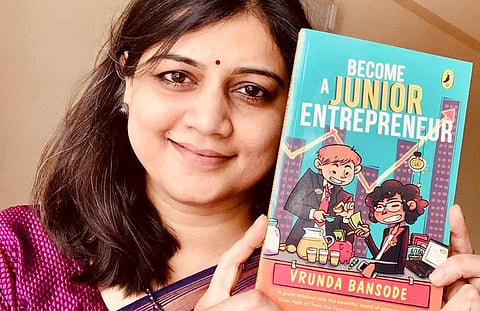

Innovation within the four walls of a lab is great, but to take that innovation to the people, a completely different set of skills is required, that of an entrepreneur. That's why after co-authoring Become A Junior Inventor alongside Nikhil Gumbhir in July 2015, Vrunda Bansode has now come out with the second book in the series, Become a Junior Entrepreneur. The Bengaluru-based writer drew on her own experience of managing incubation programmes at IIM Bangalore, the popular entrepreneurship lab she ran for high school students for five years and more importantly, her 15 years of experience in working with MNCs and start-ups. "Take a topical example, everyone is talking about large-scale manufacturing and distribution of the COVID-19 vaccine. It is in roles like these that entrepreneurs will shine," says Bansode.
The book comes loaded with activities that are fun to do and yet have a purpose to it, to drive home one or the other tenants of entrepreneurship. "Experiential education is important for children because learning by doing is the best way to learn. Hence, the book is laced with DIY activities that help children understand not just the science and principles of certain aspects but also the application of it," shares Bansode who pursued her PGDMB from Indo-German Chamber of Commerce, Mumbai. Think of the activities as gentle nudges. What will the brand of your venture look like? If you are a home-baking business, which children are taking a lot to these days, what would you call it, what emotion would you want the name to evoke? Such are the nudges that will urge children to dive into the depths of entrepreneurship.
Not just this, Bansode regales children with start-up stories that they might have caught wind of in the newspapers or while watching TV, but might not know their origin. Like that of BookMyShow, Flipkart, WhatsApp and more. And an essential glossary as well that will help you wade through all the jargon. "Thomas Edison was a great inventor and he was a good businessman too. Hence, it is important for children to understand even concepts like brand and revenue which will help them," points out Bansode. Also, there is a whole chapter on launching a socially responsible business.
Bansode would like children to read this book at their pace, take their time to do the activities, slowly absorb all that the book has to offer. One can even keep coming back to it because that's how the book is structured, children can keep referring to it. "Tomorrow, the child may grow up to become anything, a doctor, an engineer or even an accountant, but what's important is to build an entrepreneurial mindset because that helps with many aspects in life," says Bansode making a noteworthy point.
